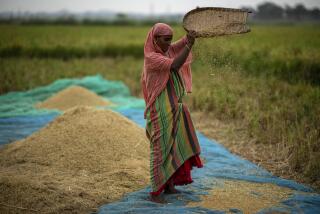After Export Cuts, Coffee Prices Soar on Volatile World Markets
- Share via
NEW YORK — The price of coffee soared on volatile world commodity markets Wednesday after producers agreed to cut exports in an effort to boost prices.
On the New York Coffee, Sugar and Cocoa Exchange, the pace-setting September contract jumped 4.95 cents to settle at $1.5230 a pound, the highest in nearly six weeks.
In London, futures prices rose $120 to $2,824 a metric ton before slipping a bit.
“The market is feeling very good now,” one London trader said.
Analysts said it was unclear whether prices on supermarket shelves would reflect the impact of the producers’ move. Retail prices rose 20% or more in the United States last year, reflecting higher prices for beans on world markets.
But while bean prices had fallen sharply until the latest rally, retail prices had not kept pace.
The Assn. of Coffee Producing Countries announced after emergency talks in New York late Tuesday that it planned to limit exports to 60 million bags, which weigh 132 pounds each, over the next 12 months.
The cuts are designed to create a supply deficit of about 10 million bags.
Officials estimated potential world exports at 69 million bags, and current demand at 71 million bags annually.
The export scheme covers 80% of global coffee production, they said. The remaining 20% is produced by countries that are not association members.
The producers moved after they had watched prices plunge in the first half of the year on profit taking after a wild run-up last year and worries about excess supplies. Coffee prices are notoriously volatile on world commodity markets.
The market already had been rallying ahead of the meeting of the association, which groups 28 producing nations and agreed to reduce exports through June, 1996.
The move would cut exports by about 9% from previously expected levels.
“We are all agreed,” declared Ivory Coast Commodities Minister Alain Gauze after the New York producer talks ended late Tuesday.
Traders were surprised that Asian and African producers agreed to join Latin American producers in limiting exports.
More to Read
Inside the business of entertainment
The Wide Shot brings you news, analysis and insights on everything from streaming wars to production — and what it all means for the future.
You may occasionally receive promotional content from the Los Angeles Times.










